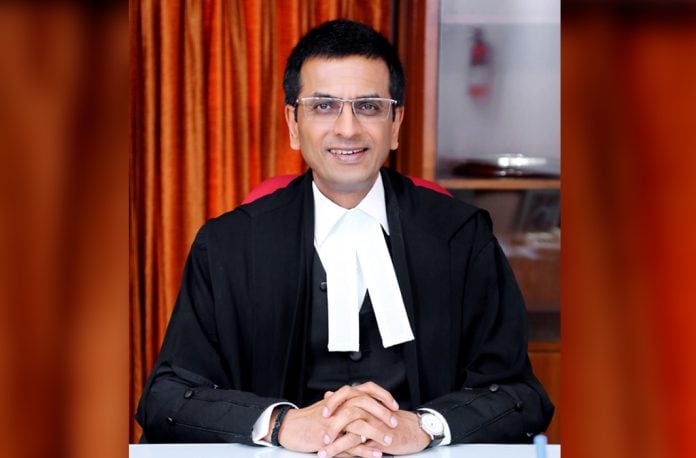Former Chief Justice of India DY Chandrachud has suggested the creation of a cohesive national platform for disability advocacy through greater collaboration between academia and the private sector, along with amendments to the Rights of Persons with Disabilities (RPWD) Act.
Speaking during a panel discussion on ‘Disability Rights & Beyond,’ organised by Mission Accessibility on Thursday, the former CJI said that since the employment was gradually shifting out of the public sector, there was a need to amend the Act by including sanctions, clear time schedules and voluntary compliance.
Batting for prioritisation of disability-related cases by courts, he said that since these matters were not like IBC, they required a Bench with empathy. The disability law cut across the societal gamut.
The former CJI also spoke about the shift in the judicial mindset, stating that the Supreme Court, which once held that blind persons could not join the judiciary, later opened its doors for the visually-disabled persons.
What began as an isolated instance has now become a movement. Persons with disability should be entitled as a matter of right, not as a matter of concession, he noted.
Justice Chandrachud applauded the Mental Healthcare Act, terming it as a forward-looking Act, especially for decriminalising attempted suicide.
Stressing on the importance of mental health in the urban environment, he highlighted work-related pressures in the legal profession, stating that those working in a law firm had to work on all 365 days in a year.
Calling for a 70-hour work week would not do any service to a labour surplus economy. For every person who left, there was someone to replace him/her, noted Justice Chandrachud.
Highlighting the importance of inclusive legal practices, he suggested the government to engage lawyers with disabilities beyond just pro bono work, and leverage technology to improve access.
The former CJI also proposed mandatory accessibility audits for public spaces and advocated for teaching sign language basics in schools.
He further spoke about his struggles to find a residence in Delhi that would cater to his two ‘beautiful’ daughters with special needs. The former CJI has to vacate his official residence by April 30.
Justice Chandrachud and his wife Kalpana Das had adopted two daughters, Priyanka and Mahi, while he was serving the Allahabad High Court.
The girls, suffering from a medical condition called nemaline myopathy, were initially just bones and flesh. Their mother had completely ignored them thinking that they were a lost cause, said the former CJI.
He remembered taking them to medical institutions for intrusive and painful tests, recalling the time when his older daughter expressed concern for her sister.
She kept saying that she did not want her sister to go through this, he said, adding that his daughters have transformed his family’s outlook on life, introducing them to veganism and instilling in them a profound respect for animals and the environment.
Speaking about the challenges his family faced due to this rare genetic condition, he said the Indian society has kept the disabled under the curtain of ignorance and suppression for a long time.
The former CJI also highlighted his initiative to establish Mitti Café, an inclusive workplace for persons with disabilities, in the Supreme Court. the cafe highlighted that disability was not a barrier. The initiative enabled the differently-abled to lead a dignified existence as service providers, not just service receivers, he noted.
He shared how the initiative inspired the President of India to start a Mitti Café at the Rashtrapati Bhavan.
The former CJI further spoke about the impact of judicial decisions. There may be 10 reasons to deny relief, but the judges needed just one good reason to give it, he observed.
The event began with Advocate Rahul Bajaj, co-founder of Mission Accessibility, delivering the welcome address.
Justice Chandrachud recalled Advocate Bajaj, a Rhodes scholar, expressing a desire to work with him. Noting that he wondered why someone would leave a Rhodes scholarship to work with him, Justice Chandrachud said his experience with Advocate Bajaj was truly enlightening.
The event also saw the launch of a new law firm, ‘Zen Access Law Associates,’ started by Advocate Bajaj and Amar Jain. The not-for-profit firm, led by lawyers with disabilities, would focus on corporate law, IP rights and litigation, while remaining open to all.
Advocating the the need for inclusive platforms, the former CJI said the court was just one avenue for change. The role of civil society could not be belittled.


